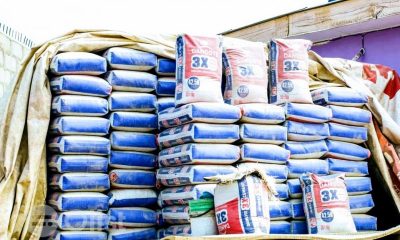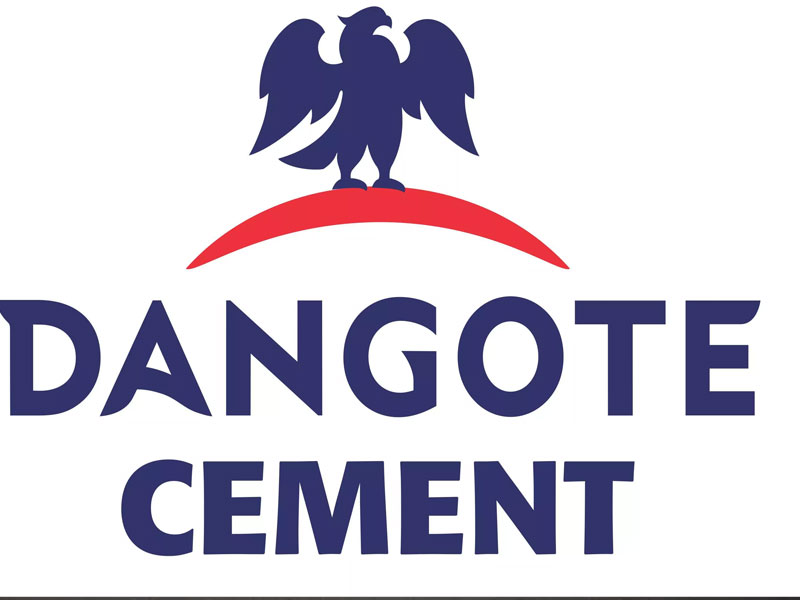Economy
Dangote Cement Shares Fall Amid Dispute With BUA Cement
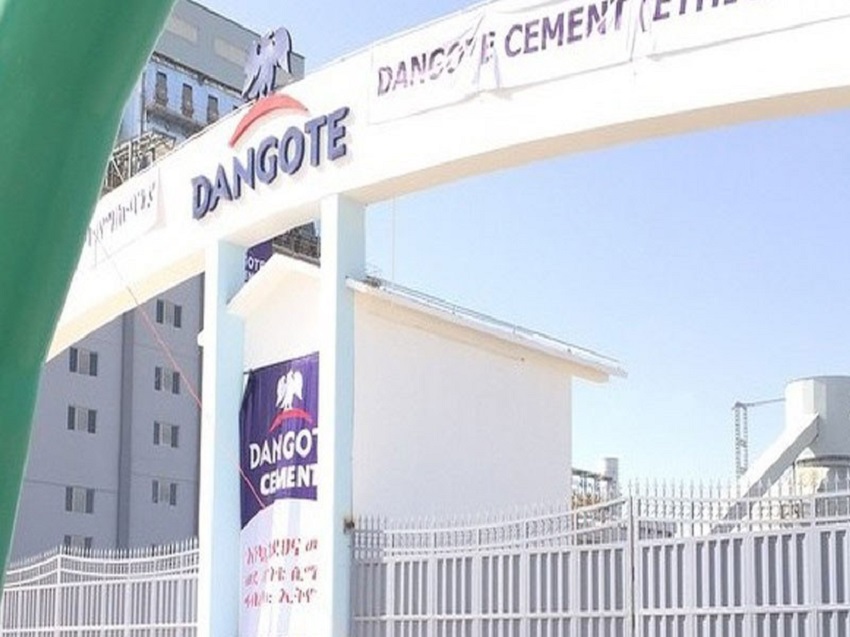
By Dipo Olowookere
The shares of Dangote Cement seem to be suffering heavily on the floor of the Nigerian Stock Exchange (NSE) as a result of the lingering crisis the firm has with one of its main competitors at the market, BUA Cement.
Late last year, BUA Group wrote an open letter to President Muhammadu Buhari, accusing Dangote Cement, owned by Africa’s richest man, Mr Aliko Dangote, of conniving with top government officials of the Ministry of Mines and Steel, including using thugs and agents of the state to ensure that its (BUA Cement) operations in Okpella, Edo State, were disrupted despite a suit pending before a Federal High Court due for hearing on December 5 and 6, 2017.
The Ministry of Mines and Steel is headed by a former Governor of Ekiti State, Mr Kayode Fayemi.
The letter, titled ‘A Cry for Help: Wanton Abuse of Power by a serving Minister geared towards sabotaging operations of BUA Cement,’ was dated December 4, 2017.
Executive Chairman/CEO of BUA Group, Mr Abdulsamad Rabiu, had urged the President to urgently intervene and investigate what it called the acts of sabotage against BUA Cement operations by Dangote Group.
He had stressed that, “The actions of Dangote Group with the collusion and connivance of highly placed officials of government especially the Minister is directed towards destroying the business of BUA cement with the ultimate goal of creating a monopoly in the cement industry in Nigeria and control the entire cement industry and market in the country.
“This with due respect should not be allowed in a democracy and a free market. Allowing such eventual monopoly is not only inimical to the growth of the cement industry and its attendant effect on the cost of construction and housing delivery to the mass of Nigerians, but also the economic wellbeing of the nation as a whole.
“It is worrisome that Dangote Group with all its visibility and international reputation is displaying such utter lack of respect for and trust in the Nigerian Judiciary.”
Days later, Dangote replied BUA Group, accusing the firm of using thugs and security operatives to carry out illegal mining activities on its mines site.
Dangote’s Executive Director, Mr Devakumar Edwin, while reacting at a press conference in Lagos, had said, “It is appalling that BUA Group in the midst of overwhelming facts want the public to believe that Dangote Group is after its business when in actual fact BUA has been the one mining illegally in Dangote Mining Lease and attacking its officials without any justification.
“The crocodile tears being shed by BUA in its cry for help and open letter to the President is most laughable and a total distraction from BUA’s continuous illegal activities within Dangote’s ML 2541 aimed at depleting and exhausting the limestone reserves in order to sabotage Dangote Group’s legitimate investment.”
In order for the crisis not to result into a breakdown of law and order, the Edo State government led by Mr Godwin Obaseki, shut down the disputed site, pending when a peaceful resolution would be reached by the aggrieved parties.
However, Business Post gathered that since the crisis started, the shares of Dangote Cement have been in freefalling mode.
A check by this newspaper showed that the share price of Dangote Cement, which traded at N245.80k per share on December 4, 2017, closed the last trading day of last year, December 29, at N230 per share.
Also, Dangote Cement opened for the first trading day of 2018 last Tuesday at N230 per share, but ended the week, Friday, January 5, 2018, at N223.11k per share.
According to details of the firm fetched by Business Post from the NSE website, Dangote Cement has authorized shares of 20 billion, but as the close of trading activities last Friday, it has an outstanding of 17.04 billion with a market capitalisation of N3.8 trillion.
How long the crisis between both firms would last is not known yet, but investors are getting worried that it might continue to bite hard on Dangote Cement’s shares.
A closer look at the shares of the company this year showed that it lost N7 on the second trading day of 2018 to close at N223 per share, but marginally gained 11k the next day to finish at N223.11k per share, and settled for the week at the same rate after trading flat.
Dangote Cement controls 65 percent of the market share in Nigeria and this was confirmed last year when the firm released its half year financial statements.
“As a result of the slower market, our Nigeria operation sold nearly 6.9Mt of cement, down 21.8 percent on the 8.8Mt sold in the first half of 2016. We estimate our market share to have been about 64.5 percent during the first six months of 2017,” Chief Executive Officer of the company, Mr Onne van der Weijde, had said.
Economy
Conoil Ships First Cargo of Obodo Crude from Nigeria to Germany
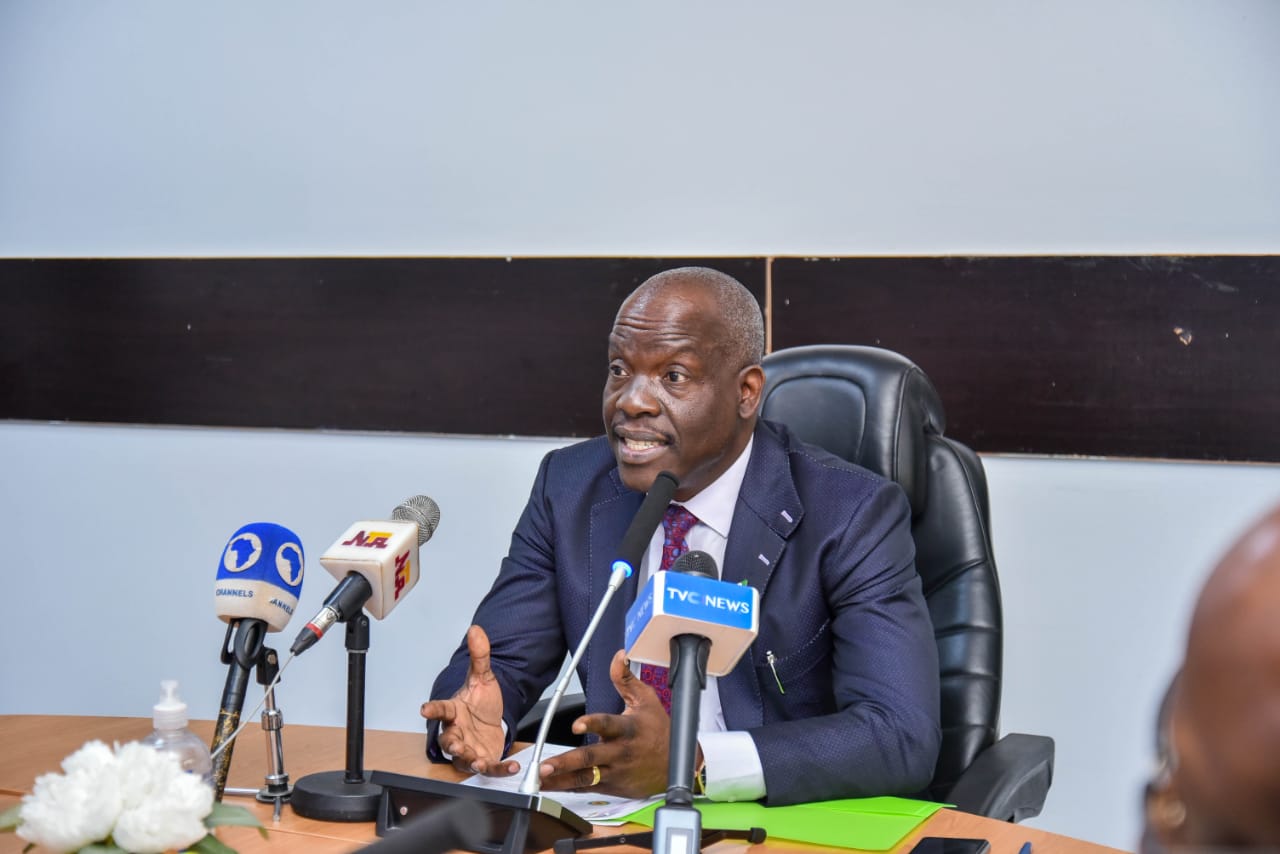
By Adedapo Adesanya
The Nigerian Upstream Petroleum Regulatory Commission (NUPRC) says the first cargo of the new Obodo crude blend has been shipped.
Business Post gathered that the first cargo could be headed for the North Sea port of Wilhelmshaven, Germany.
In a statement by the chief executive of NUPRC, Mr Gbenga Komolafe, Conoil Producing Limited was congratulated on the successful shipment of the first cargo of the Obodo crude blend.
Mr Komolafe said this development marks a significant milestone for Nigeria’s upstream sector, demonstrating the growing capacity of indigenous operators to contribute meaningfully to national crude oil production and exports.
“The introduction of the Obodo crude blend further diversifies Nigeria’s export portfolio and aligns with the commission’s strategic objectives to enhance production output, maximise hydrocarbon resources, and attract investment through operational efficiency and innovation,” he said.
Mr Komolafe maintained that this achievement by Conoil, under the production sharing contract framework with the Nigerian National Petroleum Company Limited, also reflects the positive outcomes of collaborative regulatory support, enabling indigenous players to thrive.
“As the regulator of Nigeria’s upstream petroleum industry, the NUPRC remains committed to providing a transparent, predictable, and investment-friendly environment that encourages the development of new crude streams and ensures optimal value for the Nigerian people.
“We look forward to more milestones of this nature that advance national energy security and economic resilience,” he said.
According to tracking data from Kpler, the Suezmax Atlanta Spirit loaded on April 25 from the floating production, storage and offloading vessel Tamara Tokoni.
Obodo has a gravity of 27.65°API and a very low sulphur content of 0.05pc, according to Argus.
Obodo joins the list of crude grades launched by Nigeria in the last year.
The Nigerian National Petroleum Company (NNPC) restarted production of similar-quality Utapate in 2024 and launched Nembe a year earlier.
Obodo could find favour with European refineries, as Nigerian medium sweet grades — including Forcados, Escravos and Bonga — have gone predominantly to Europe, the largest market for the country’s crude.
Economy
Dangote Refinery Cancels June Maintenance on Petrol Producing Unit
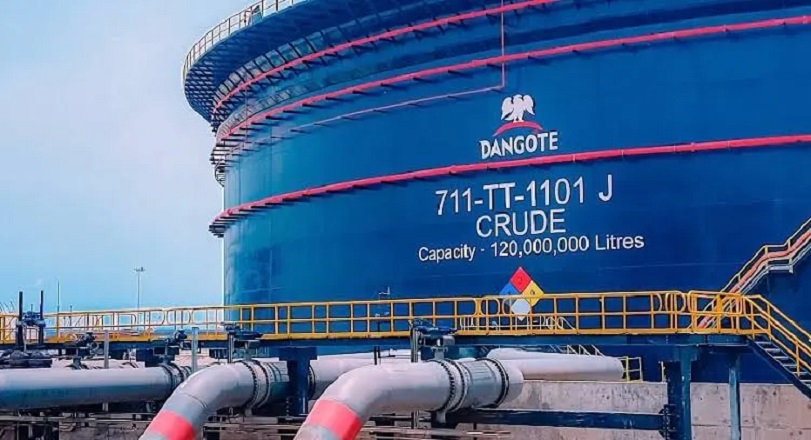
By Adedapo Adesanya
Dangote Oil Refinery has reportedly cancelled planned maintenance on its 204,000 barrels per day petrol-producing unit for June.
This comes as the $20 billion structure has carried out the necessary work during an unplanned shutdown from April 7 to May 11, according to industry tracker, IIR.
Dangote Refinery had originally scheduled a 30-day maintenance shutdown in June for its gasoline-producing Residue Fluid Catalytic Cracking (RFCC) unit.
The refinery has since pushed back on reports of the unit being under unplanned repair, stating that such claims are not entirely accurate.
According to data from shipping analytics firm, Kpler, during the unplanned outage, the refinery ramped up exports of residual products such as straight run fuel oil, while shipments of finished fuels like jet fuel and gasoil declined.
The 650,000 barrels per day refinery, built by Africa’s richest man, Mr Aliko Dangote, began producing diesel, naphtha, and jet fuel in January last year, followed by petrol production in September.
Dangote refinery could potentially end the long-standing gasoline trade from Europe to Africa, which is valued at $17 billion annually.
Already, the refinery has triggered a spate of changes in fuel prices locally with back to back cuts down to N825 per litre earlier this week from N835 previously sold.
The refinery, however, has not been able to operate at its optimal level due to challenges around feedstock. So far, in addition to local crude acquisition, it has bought crude from the US, Brazil, Angola, and Algeria.
Economy
Unlisted Stocks Rise N19.77bn Amid High Activity
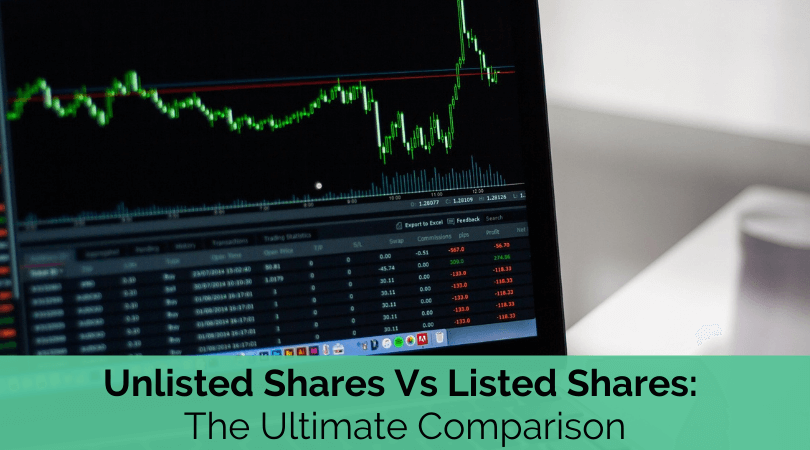
By Adedapo Adesanya
The NASD Over-the-Counter (OTC) Securities Exchange rose further by 1.02 per cent on Tuesday, May 13, buoying the market capitalisation by N19.77 billion to close at N1.967 trillion compared with the preceding day’s N1.947 trillion.
In the same vein, the NASD Unlisted Security Index (NSI) went up by 33.77 points to finish at 3,359.79 points, in contrast to the 3,326.06 points reported a day earlier.
Central Securities Clearing System (CSCS) Plc increased during the trading session by N2.35 to N27.20 per share from N24.85 per share, NASD Plc added N1.90 to close at N20.90 per unit compared with the previous day’s N19.00 per unit, FrieslandCampina Wamco Nigeria Plc gained 87 Kobo to close at N41.30 per share versus the previous closing value of N40.43 per share, Mixta Real Estate Plc climbed higher by 51 Kobo to end at N5.51 per unit compared with Monday’s price of N5.00 per unit, and AG Mortgage Bank Plc appreciated by 5 Kobo to settle at 58 Kobo per share, in contrast to the preceding session’s 53 Kobo per share.
The level of activity was higher yesterday, with the volume of securities transacted going up by 61,474.7 per cent to 414.5 million units from the 673,233 units traded in the previous trading day, the value of trades jumped by 16,714.4 per cent to N1.05 billion from N6.3 million, but the number of deals fell by 28.6 per cent to 25 deals from 35 deals.
Impresit Bakolori Plc remained the most active stock by volume on a year-to-date basis with 536.9 million units worth N524.7 million, followed by Geo-Fluids Plc with 266.3 million units sold for N470.5 million, and Okitipupa Plc with 153.6 million units valued at N4.9 billion.
Okitipupa Plc also remained the most active stock by value on a year-to-date basis with 153.6 million units sold for N4.9 billion, trailed by FrieslandCampina Wamco Nigeria Plc with 20.2 million units valued at N770.6 million, and Impresit Bakolori Plc with 536.9 million units worth N524.7 million.
-

 Feature/OPED5 years ago
Feature/OPED5 years agoDavos was Different this year
-
Travel/Tourism9 years ago
Lagos Seals Western Lodge Hotel In Ikorodu
-

 Showbiz2 years ago
Showbiz2 years agoEstranged Lover Releases Videos of Empress Njamah Bathing
-

 Banking7 years ago
Banking7 years agoSort Codes of GTBank Branches in Nigeria
-

 Economy2 years ago
Economy2 years agoSubsidy Removal: CNG at N130 Per Litre Cheaper Than Petrol—IPMAN
-

 Banking2 years ago
Banking2 years agoFirst Bank Announces Planned Downtime
-

 Sports2 years ago
Sports2 years agoHighest Paid Nigerian Footballer – How Much Do Nigerian Footballers Earn
-

 Technology4 years ago
Technology4 years agoHow To Link Your MTN, Airtel, Glo, 9mobile Lines to NIN



